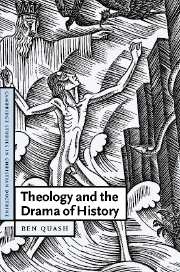Book contents
- Frontmatter
- Contents
- Acknowledgements
- List of abbreviations
- Introduction
- 1 Dramatizing theology
- 2 Freedom and indifference
- 3 Epic history and the question of tragedy
- 4 Eschatology and the existential register
- 5 Analogy's unaccountable scaffolding
- 6 Theodramatics, history and the Holy Spirit
- Postscript
- Select bibliography
- Index
3 - Epic history and the question of tragedy
The cast, the stage and the action, part II
Published online by Cambridge University Press: 22 September 2009
- Frontmatter
- Contents
- Acknowledgements
- List of abbreviations
- Introduction
- 1 Dramatizing theology
- 2 Freedom and indifference
- 3 Epic history and the question of tragedy
- 4 Eschatology and the existential register
- 5 Analogy's unaccountable scaffolding
- 6 Theodramatics, history and the Holy Spirit
- Postscript
- Select bibliography
- Index
Summary
Batter, batter the doom drum, but believe there'll be better.
(aeschylus, Oresteia, line 159)This chapter, and the one after it, continue to be about the cast, the stage and the action of Christian life (or ‘mission’) in the world, with an increasingly focused concentration on the nature of the action – in other words, the way that historical events and history's ‘end’ are best understood. In that connection, the chapter will continue to be concerned with the importance of the Church and the saints (especially Mary) in their relation to the historical unfolding of events. The great difference between this chapter and the previous one is that it begins to press much harder both on von Balthasar's and on Hegel's thought, to see whether fissures are opened up between them and weaknesses exposed within the thought of each by the force of a new kind of challenge. It begins to trace von Balthasar's attempts to define himself against Hegel. It looks at the grounds on which he asserts such differences, and it assesses how convincing, in the end, his arguments seem.
At the head of this chapter stands a choric utterance from the same work with which we began our treatment of drama in chapter 1: Aeschylus' Oresteia:
Sing sorrow, sorrow: but good win out in the end.
(line 121)Or in Tony Harrison's translation, which tries to be faithful to the often onomatopoeic bluntness of the original chorus:
Batter, batter the doom drum, but believe there'll be better.
(line 159)- Type
- Chapter
- Information
- Theology and the Drama of History , pp. 85 - 118Publisher: Cambridge University PressPrint publication year: 2005



